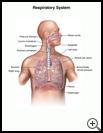
Lung Aspiration
________________________________________________________________________
KEY POINTS
- Breathing a substance other than air into your airways is called lung aspiration. Many things can cause a problem with breathing, or swallowing, or both. Inhaling, as when laughing, when you have food or fluid in your mouth can also cause aspiration.
- There is no treatment for aspiration itself. Aspiration pneumonia is treated with antibiotic medicine.
- If you have ongoing problems with aspiration, you may be referred to a speech therapist for further testing or therapy. Don’t talk or laugh when you are drinking or have food in your mouth.
________________________________________________________________________
What is lung aspiration?
Breathing a substance other than air into your airways is called lung aspiration. The substance could be a foreign body such as a tongue ring, food, liquid, pills, vomit, or saliva.
What is the cause?
Normally, things that you swallow go into your esophagus (food pipe). Your windpipe sits in front of the esophagus and leads to your lungs. Swallowing and breathing normally work together to prevent anything in your food pipe from going down your windpipe and into your lungs. But, some things can cause a problem with breathing, or swallowing, or both. These include:
- Nervous system disorders, such as a stroke or multiple sclerosis
- An injury to the throat or vocal cords
- Being born with a problem in your throat or vocal cords
- A breathing disorder, such as chronic obstructive pulmonary disease (COPD)
- Gastroesophageal reflux disease (GERD)
- Medicines or surgery
- Abusing drugs or alcohol
Inhaling, as when laughing, when you have food or fluid in your mouth can also cause aspiration. This can also happen when you are vomiting and inhale.
What are the symptoms?
The main symptom is choking or coughing before or after you swallow. Choking or coughing is the way that your body tries to remove something from the windpipe. People with a weak cough may not be able to prevent aspiration.
Symptoms can include:
- Trouble breathing
- Coughing
- Chest pain when you breathe or cough
After breathing in a foreign substance, you may have lung damage or you may develop a lung infection called aspiration pneumonia. Symptoms include:
- Fever
- Unusual tiredness
- Cough that brings up bad-smelling mucus from the lungs
How is it diagnosed?
Your healthcare provider will ask about your symptoms and medical history and examine you.
You may have tests to check your swallowing that may include:
- Barium swallow, which is an X-ray taken of your food pipe after you swallow barium. Barium is a liquid that helps your esophagus show up well on the X-ray.
- Videofluoroscopic swallowing study, which is a video X-ray to show how you swallow foods such as thin liquids, thickened liquids, pudding, and cookies or crackers
You may have other tests to check for pneumonia:
- Chest X-ray to look at your lungs
- Sputum culture, which is a test of a sample of mucus coughed up from deep in your lungs
How is it treated?
If you have ongoing problems with aspiration, you may be referred to a speech therapist for further testing or therapy.
There is no treatment for aspiration itself. Aspiration pneumonia is treated with antibiotic medicine.
How can it be prevented?
Follow these precautions to keep from breathing substances into your airways:
- Don’t talk or laugh when you are drinking or have food in your mouth.
- Don’t talk or laugh when you are drinking or have food in your mouth.
- Avoid foods that you have trouble swallowing. If you have trouble swallowing a medicine, ask your healthcare provider if there is a different form of the medicine that may be easier for you to swallow.
- If you have a swallowing problem, you can learn ways to eat and drink that avoid choking and help keep you from breathing in food or saliva. Ask your healthcare provider about seeing an occupational therapist or other specialist.
- If you have a problem with alcohol or drug abuse, seek counseling and treatment.

